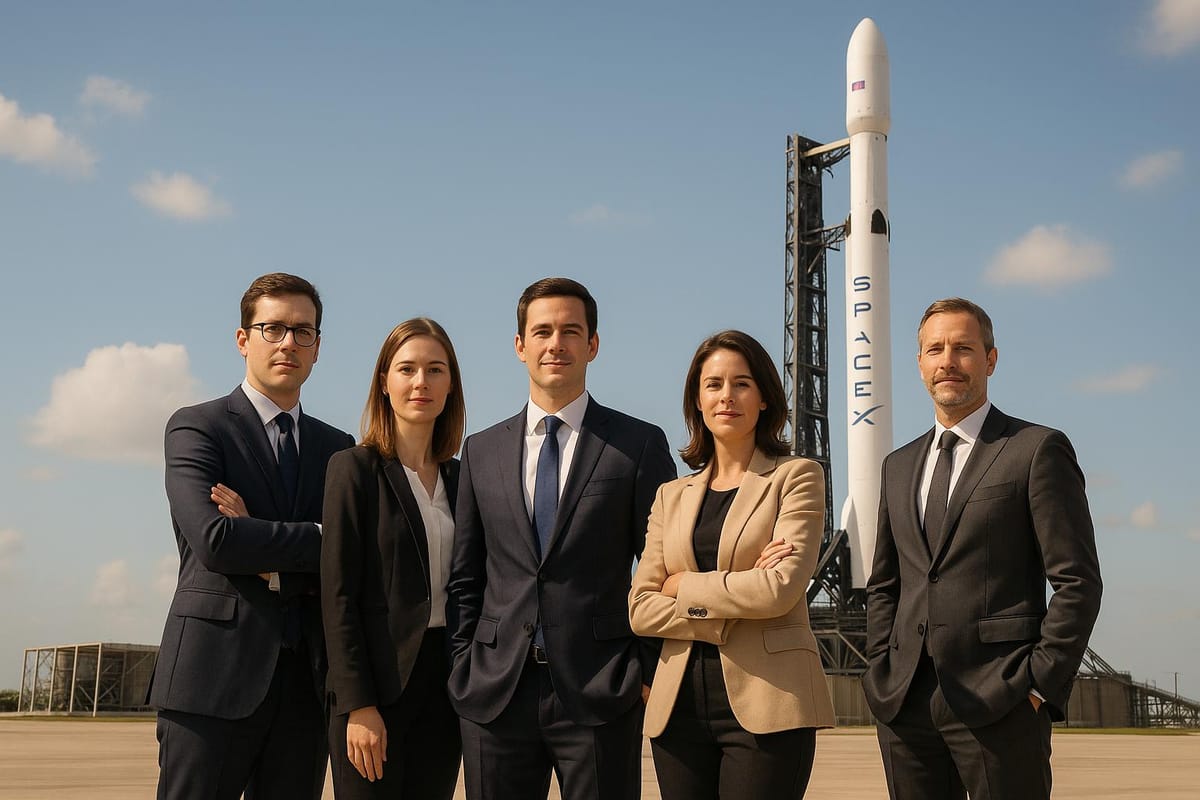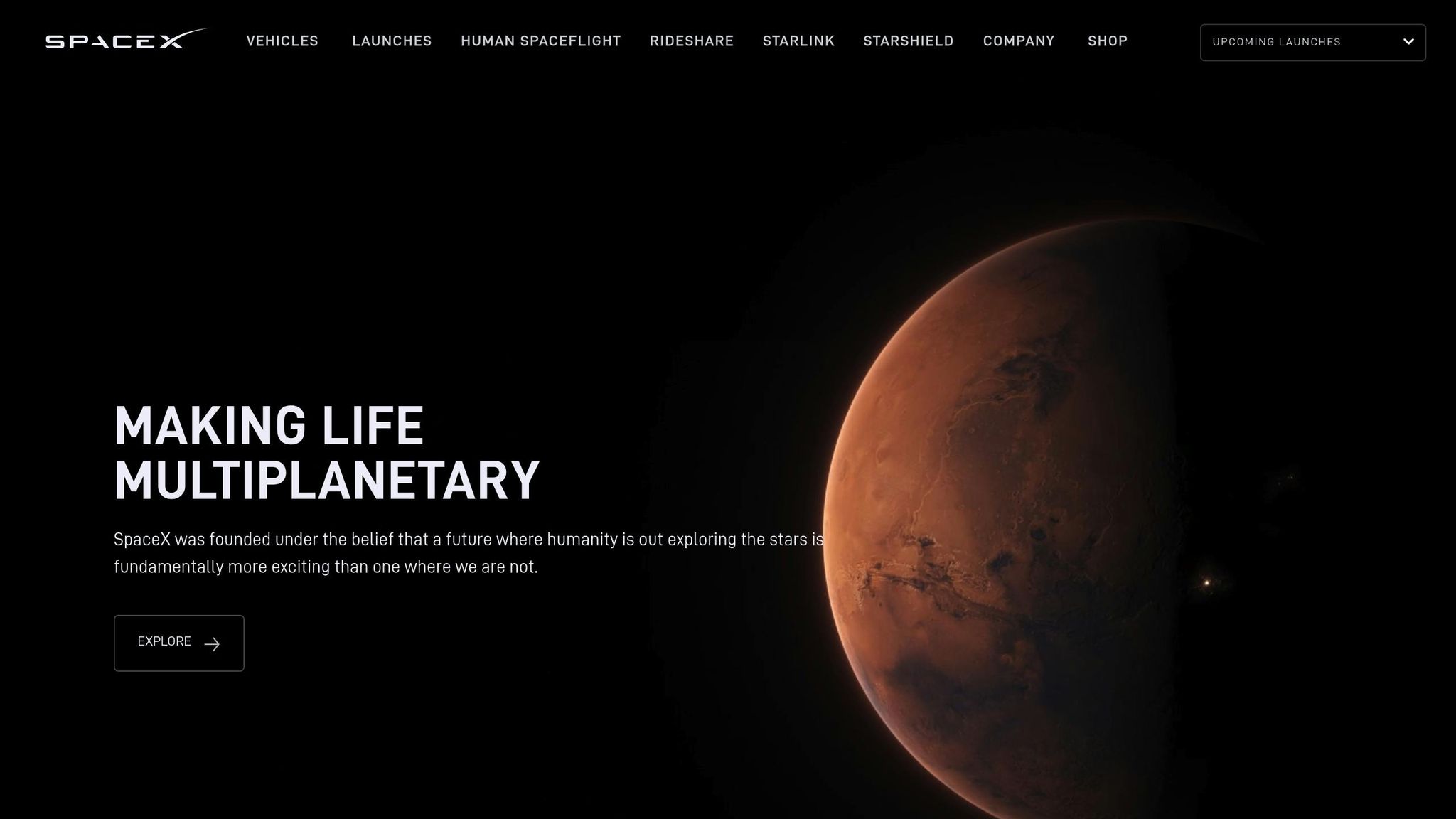Top 5 Venture Capital Firms Backing SpaceX
Explore the top venture capital firms that have significantly invested in SpaceX, driving innovation in aerospace and satellite technology.

SpaceX, founded by Elon Musk in 2002, has redefined private space exploration by raising $11.9 billion across 30+ funding rounds. With a valuation of $400 billion as of July 2025, the company has attracted major venture capital firms that have fueled its growth. Here are the top five firms that played a key role:
- Andreessen Horowitz (a16z): Led a $750M Series J round in 2023, supporting Starlink expansion and launch operations.
- Founders Fund: Invested $20M in 2008 and participated in multiple rounds, helping SpaceX during its early financial challenges.
- Sequoia Capital: Contributed $1B in 2015's Series F round, driving reusable rocket development and Starlink's initial phases.
- Fidelity Investments: Supported SpaceX across multiple rounds, including leading the $1.68B Series I in 2020.
- Google (Alphabet Inc.): Invested $900M in 2015, later increasing its stake to 7%, aiding Starlink and global expansion.
These firms provided the financial backing that enabled SpaceX to innovate in reusable rockets, satellite internet, and interplanetary travel. Each investor brought unique timing and strategies, aligning with SpaceX's ambitious goals.
SpaceX valuation is maybe even conservative, says Sequoia's Shaun Maguire

1. Andreessen Horowitz (a16z)

Andreessen Horowitz took a central role in SpaceX's growth by leading a massive $750 million Series J funding round in 2023. This infusion of capital helped SpaceX scale its operations, particularly by expanding the Starlink satellite network and enhancing its launch capabilities.
This high-profile investment from a16z reflects their strong belief in SpaceX's vision and its potential to reshape the aerospace industry. The results speak for themselves: since the 2023 funding, SpaceX's valuation has soared to $400 billion as of July 2025, with projected revenues climbing from $11.8 billion in 2024 to $15.5 billion in 2025.
By channeling resources into satellite internet and launch operations, a16z's involvement demonstrates how smart investments can fuel innovation in the commercial space sector. Up next, we'll look at another major player in SpaceX's funding journey.
If you're curious about how venture capital firms back transformative companies like SpaceX, the SpaceX Stock Investment Guide offers insights into private equity strategies and pre-IPO opportunities in the aerospace industry.
2. Founders Fund

Founders Fund played a key role in SpaceX's early days, stepping in during a critical period of financial uncertainty. In 2008, they made a bold $20 million investment, coinciding with SpaceX securing a $1.6 billion NASA Commercial Resupply Services contract - a turning point for the company.
This wasn’t just a one-time show of support. Founders Fund backed SpaceX through multiple funding rounds as the company grew, driven by a shared vision of making space exploration more accessible and even enabling interplanetary travel. Their ongoing involvement reflected a high-risk, high-reward approach that ultimately helped SpaceX solidify its position in the aerospace industry. This support didn’t just provide capital; it also gave SpaceX the credibility needed to attract major institutional investors.
Led by figures like Peter Thiel, Founders Fund’s early endorsement sent a strong signal to other investors. This validation opened doors for heavyweights like Google, Fidelity, and Sequoia Capital to contribute to SpaceX’s funding. These investments were critical for advancing ambitious projects like Starship and the Starlink satellite network, which required billions in development costs.
The value of Founders Fund’s early investment has grown significantly over the years, showcasing the potential rewards of supporting transformative companies.
If you're interested in how venture capitalists identify and back companies like SpaceX, check out the SpaceX Stock Investment Guide for tips on navigating pre-IPO opportunities.
3. Sequoia Capital

After the notable investments by a16z and Founders Fund, Sequoia Capital's backing played a key role in shaping SpaceX's trajectory.
In 2015, Sequoia Capital participated in SpaceX's Series F funding round with a massive $1 billion investment, showcasing their belief in SpaceX's ambitious vision.
This infusion of funds helped SpaceX push forward on several fronts: advancing reusable rocket technology, kickstarting the Starlink satellite network, and ramping up manufacturing and research efforts. Beyond just financial support, Sequoia Capital brought strategic expertise to the table. Their experience in scaling fast-growing tech companies gave SpaceX access to a network of industry leaders and operational know-how.
The results of this partnership were soon evident. The Series F round became a springboard for SpaceX to make significant strides in reusable rockets and to lay the groundwork for Starlink. The involvement of other major investors like Google and Fidelity further highlighted the immense potential of the company.
Sequoia Capital’s approach, which emphasizes long-term and resource-intensive projects, aligned seamlessly with SpaceX's bold goals. Their involvement illustrates how venture capital can play a pivotal role in driving innovation in sectors like aerospace and advanced technology.
For those curious about how top venture capital firms assess and support groundbreaking companies like SpaceX, the SpaceX Stock Investment Guide provides an in-depth look at pre-IPO investment strategies and private space market valuations.
4. Fidelity Investments

Fidelity Investments has played a key role in SpaceX's journey, providing critical funding that fueled the company's ambitious growth.
The partnership between Fidelity and SpaceX began in January 2015 when Fidelity, alongside Google, contributed $1 billion during SpaceX's Series F funding round. This funding was instrumental in advancing projects like the Starlink satellite network and reusable rocket technology. Fidelity's support didn’t stop there - by 2020, the investment firm led the Series J round with a substantial $1.68 billion injection, further solidifying its commitment to SpaceX’s vision.
What makes Fidelity’s involvement stand out is its long-term approach. By participating in multiple funding rounds, Fidelity demonstrated unwavering confidence in SpaceX’s potential. Analysts have often highlighted Fidelity’s role as a dependable early supporter, providing essential backing during SpaceX’s most financially demanding periods.
The results speak for themselves. Since Fidelity's initial investment in 2015, SpaceX's valuation has skyrocketed from $12 billion to an estimated $400 billion as of July 2025 - a staggering return on investment.
For those looking to understand more about private market opportunities in aerospace, the SpaceX Stock Investment Guide offers valuable insights into pre-IPO strategies.
5. Google (Alphabet Inc.)
Back in January 2015, Alphabet Inc. made waves in the commercial space industry with a hefty $900 million investment in SpaceX. This funding round, shared with Fidelity, valued SpaceX at $12 billion at the time. This move wasn’t just about the money - it marked the beginning of a strategic partnership that would evolve over the years.
That initial $900 million helped fuel SpaceX’s ambitions, particularly with the expansion of its Starlink satellite network and its launch capabilities. Alphabet didn’t stop there. By December 2021, the company had increased its stake in SpaceX to approximately 7% through additional funding rounds.
But Alphabet’s involvement goes beyond just writing checks. Its expertise in cloud infrastructure and data services has played a key role in supporting SpaceX’s mission to provide global internet connectivity. This collaboration has been a game-changer, with analysts pointing out that it not only strengthened SpaceX’s position but also helped draw significant tech investment into the private space sector.
For investors, Alphabet’s stake in SpaceX offers an indirect way to tap into the growing space economy. While SpaceX remains a private company, Alphabet shareholders benefit from its growth as part of the tech giant’s broader portfolio. Over time, SpaceX’s impressive progress has translated into solid returns for early supporters like Alphabet.
Investment Comparison Table
Examining the investment strategies of key firms reveals the unique timing and scale decisions that have propelled SpaceX's remarkable growth. These strategies trace the financial journey of SpaceX, from its early days as a startup to its position as a global leader in aerospace.
Founders Fund took a bold step in 2008 with a $20 million investment, making an early bet on SpaceX's potential. In contrast, Andreessen Horowitz entered much later, leading a $750 million Series J round in 2023. By that point, SpaceX had already proven its business model but still offered room for significant growth. The table below outlines the distinct approaches of these major investors:
| Firm | Key Investment Rounds | Investment Focus | Timing |
|---|---|---|---|
| Andreessen Horowitz | Led $750M in Series J (2023) | Starlink expansion, launch operations | Late-stage growth |
| Founders Fund | $20M (2008) and multiple early rounds | Technology development, venture strategy | Early-stage pioneer |
| Sequoia Capital | Participated in $1B Series F (2015) | Supporting technological innovation | Mid-stage scaling |
| Fidelity Investments | Invested in multiple rounds (e.g., Series I and Series F) | Operational expansion and technology scaling | Institutional backing |
| Google (Alphabet) | $900M in 2015; later increased stake to ~7% | Starlink network development, global expansion | Strategic partnership |
The scale of investments also highlights key differences. For instance, Google's $900 million commitment in January 2015, when SpaceX was valued at approximately $12 billion, stands out as one of the largest single investments. By December 2021, Alphabet had grown its stake to about 7% of the company. With SpaceX now valued at roughly $400 billion, that stake is estimated to be worth around $28 billion.
This comparison underscores the varied strategies investors have employed. Fidelity, for example, gradually built its position while supporting SpaceX through multiple stages of scaling. Meanwhile, Andreessen Horowitz's focus on Starlink and launch operations, Sequoia Capital's involvement in a $1 billion funding round, and Founders Fund's early confidence in SpaceX demonstrate the diverse ways these firms contributed to the company's success.
For those looking to dive deeper into these patterns, the SpaceX Stock Investment Guide provides detailed insights into SpaceX's valuation trends and private equity strategies, offering a helpful resource for navigating this intricate investment landscape ahead of any potential IPO.
Conclusion
The story of SpaceX's rise highlights how carefully planned venture capital partnerships can transform a bold idea into a powerhouse in the private aerospace industry. Starting with Founders Fund’s daring $20 million investment in 2008, and followed by substantial contributions in later funding rounds, these five firms provided more than just money - they gave SpaceX the freedom to innovate without the constant scrutiny and short-term demands of public markets. This financial backing laid the groundwork for extraordinary advancements, as outlined below.
Through these investments, SpaceX has achieved groundbreaking milestones, from pioneering reusable rockets to deploying Starlink’s global satellite network. Each funding round came at a pivotal juncture, enabling the company to stay ahead of competitors, scale its manufacturing capabilities, and explore new markets.
The alignment of early and late-stage investments with SpaceX's strategic goals allowed the company to maintain its momentum and solidify its place as a leader in aerospace innovation. These partnerships were not just about funding - they were about fostering long-term growth and technological excellence.
The impact of these investments extends beyond SpaceX itself, reflecting broader trends in the private space industry. Venture capital is playing a crucial role in accelerating innovation across the sector, fueling growth and delivering impressive returns for early investors. SpaceX, in particular, has become a driving force in the rapidly expanding space economy, setting a benchmark for other companies to follow.
For those interested in exploring the financial strategies behind SpaceX’s success, the SpaceX Stock Investment Guide offers a detailed look at the company’s valuation trends and investment opportunities.
Ultimately, SpaceX’s journey underscores how venture capital partnerships can push the boundaries of what’s possible in capital-intensive fields. With projects like Starship and its ambitious launch schedule, SpaceX continues to set its sights on new horizons, all while edging closer to the possibility of entering public markets.
FAQs
How have venture capital firms helped drive SpaceX's growth and innovation?
Venture capital firms have been pivotal in fueling SpaceX's journey, offering the financial backing necessary to develop cutting-edge technologies and expand its operations. Their investments have powered major initiatives, including reusable rocket systems, satellite launches, and the ambitious Starship program, allowing SpaceX to redefine what's possible in space exploration.
Beyond funding, these firms provided strategic guidance and access to valuable networks. This support has helped SpaceX forge partnerships, draw in exceptional talent, and strengthen its position in the aerospace market. Together, these contributions have been key to SpaceX's rise as an industry leader.
Why did Google invest in SpaceX, and how does this support their long-term goals?
Google has made a significant investment in SpaceX to push forward the development of advanced satellite technology and expand global internet access. This move ties directly to Google's broader goal of increasing internet availability in underserved areas, potentially bringing millions of new users online and strengthening their digital ecosystem.
Through this partnership, Google taps into SpaceX's groundbreaking aerospace innovations, including the Starlink satellite network. This collaboration not only supports Google's mission to connect the world through technology but also places them at the leading edge of advancements in space and communications.
What are the advantages of investing in private space companies like SpaceX before they go public?
Investing in private space companies, like SpaceX, before they hit the public markets can open the door to some exciting opportunities. Getting in early often means tapping into the potential for substantial growth as these companies push boundaries in a fast-evolving industry. Plus, private investments sometimes allow investors to acquire equity at a lower valuation compared to what might be available after an IPO.
That said, this kind of investing isn’t without its challenges. Private investments can be less liquid, meaning it might be harder to sell your stake when you want to. There’s also more uncertainty involved. To navigate these risks, it’s crucial to dive deep into the company’s financials, understand its position in the market, and evaluate its long-term outlook before committing your money.
Comments ()